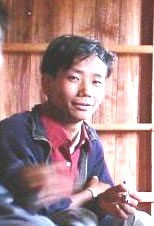Naga, Lao in Myanmar (Burma)

Photo Source:
Anonymous
|
Send Joshua Project a map of this people group.
|
| People Name: | Naga, Lao |
| Country: | Myanmar (Burma) |
| 10/40 Window: | Yes |
| Population: | 1,100 |
| World Population: | 1,100 |
| Primary Language: | Naga, Lao |
| Primary Religion: | Christianity |
| Christian Adherents: | 90.00 % |
| Evangelicals: | 45.00 % |
| Scripture: | Translation Started |
| Ministry Resources: | No |
| Jesus Film: | No |
| Audio Recordings: | No |
| People Cluster: | South Asia Tribal - Naga |
| Affinity Bloc: | South Asian Peoples |
| Progress Level: |
|
Introduction / History
Lao is also spelled as Law or Loh. Lao is what the people call themselves and their language. Other people call them Law.
The Lao Naga are included in some of the literature under Konyak Naga or Leinong Naga, but low lexical similarity shows Lao is a distinct language. There is very little (if any) dialect variation among all the Lao Naga villages in Myanmar. Law village is the main village and the prestige dialect.
Where Are they Located?
The Lao people live in 2-3 villages along the border with India in Sagaing Division, Khamti District, Lahe Township, with about 200 total households. Law village is the largest and most important village. Their speech variety is reportedly very different from other varieties in Lahe Township. According to the interviews conducted by Saul (2005:30), the Lao people originally came from Pesao in Nagaland, India.
What Are Their Lives Like?
Whenever Leinong people meet Lao people, the Lao people switch to Leinong, and the Leinong subjects said that they can easily understand the Lao people's Leinong. Leinong people reported that they do not understand the Lao language at all. Literature materials are beginning to be developed in Leinong. Since many Lao people seem to be bilingual in Leinong, it may
be possible for the Lao people to use Leinong materials. However, since the survey team has not been able yet to visit any Lao villages, the team is not sure what the Lao people think of the Leinong people or language. More research should be done to confirm that Lao people can adequately use Leinong literature.
What Are Their Beliefs?
The Lao people are majority Christian. Many are bilingual in Leinong Naga and/or Burmese.